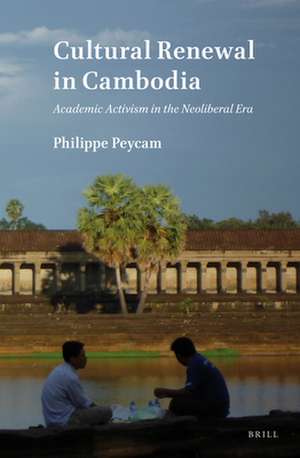Cultural Renewal in Cambodia: Academic Activism in the Neoliberal Era
Autor Philippe Peycamen Limba Engleză Hardback – 26 aug 2020
The account is a reflection on past ambitions and failures of the international good-will order, and a charge to change our approach in the future. It offers a cautionary tale whose significance transcends the Cambodian case.
Preț: 580.77 lei
Preț vechi: 708.26 lei
-18% Nou
Puncte Express: 871
Preț estimativ în valută:
111.14€ • 120.69$ • 93.36£
111.14€ • 120.69$ • 93.36£
Carte indisponibilă temporar
Doresc să fiu notificat când acest titlu va fi disponibil:
Se trimite...
Preluare comenzi: 021 569.72.76
Specificații
ISBN-13: 9789004433908
ISBN-10: 9004433902
Dimensiuni: 155 x 235 mm
Greutate: 0 kg
Editura: Brill
Colecția Brill
ISBN-10: 9004433902
Dimensiuni: 155 x 235 mm
Greutate: 0 kg
Editura: Brill
Colecția Brill
Cuprins
Acknowledgements
List of Illustrations
Abbreviations
Introduction
1 A Post-Colonial Nation
1 French Rule (1863–1953)
2 Independent Cambodia (1953–1970)
2 Civil War, Genocide and CEDORECK
1 The Khmer Republic (1970–75)
2 The Khmer Rouge (1975–79)
3 Rebuilding from the Ashes
3 Cambodia after UNTAC
1 UNTAC and Its Legacies
2 Education after UNTAC
3 From ‘Media to Digital Democracy’?
4 Non-Governmental Organizations
4 The Center for Khmer Studies
1 Defining the Center’s Mission
2 Building ‘From the Bottom-Up’
5 An Integrated Capacity-Building Program
1 Programmatic Genesis
2 The Junior Faculty Training Program (2004–10)
6 A Citizen’s Institution
1 Conservation of (and Access to) Written Materials and Artifacts
2 Expanding Creative Knowledge: Working with Artists and Craftsmen
3 Community Engagement in Siem Reap
7 Socially Engaged Scholars?
1 Involving International Scholars
2 Facilitating Special Educational Activities
3 Relations with Individual Scholars
8 Funders as ‘Stakeholders’?
1 Individual Philanthropists
2 Foundations
9 Working with International Organizations and Cultural Diplomacies
1 The World Bank
2 United Nations Educational, Scientific and Cultural Organization (UNESCO)
3 Working with Diplomats
Conclusion
Appendix
Maps and Figures
Bibliography
Index
List of Illustrations
Abbreviations
Introduction
Part 1: The Politics of Knowledge in Cambodia
1 A Post-Colonial Nation
1 French Rule (1863–1953)
2 Independent Cambodia (1953–1970)
2 Civil War, Genocide and CEDORECK
1 The Khmer Republic (1970–75)
2 The Khmer Rouge (1975–79)
3 Rebuilding from the Ashes
3 Cambodia after UNTAC
1 UNTAC and Its Legacies
2 Education after UNTAC
3 From ‘Media to Digital Democracy’?
4 Non-Governmental Organizations
Part 2: The Making of a Hybrid Academic Institution
4 The Center for Khmer Studies
1 Defining the Center’s Mission
2 Building ‘From the Bottom-Up’
5 An Integrated Capacity-Building Program
1 Programmatic Genesis
2 The Junior Faculty Training Program (2004–10)
6 A Citizen’s Institution
1 Conservation of (and Access to) Written Materials and Artifacts
2 Expanding Creative Knowledge: Working with Artists and Craftsmen
3 Community Engagement in Siem Reap
Part 3: Social Responsibilities: Scholars, Funders and Diplomats
7 Socially Engaged Scholars?
1 Involving International Scholars
2 Facilitating Special Educational Activities
3 Relations with Individual Scholars
8 Funders as ‘Stakeholders’?
1 Individual Philanthropists
2 Foundations
9 Working with International Organizations and Cultural Diplomacies
1 The World Bank
2 United Nations Educational, Scientific and Cultural Organization (UNESCO)
3 Working with Diplomats
Conclusion
Appendix
Maps and Figures
Bibliography
Index
Notă biografică
Philippe M. F. Peycam, PhD. (1999), School of Oriental and African Studies, University of London, is Director of the International Institute for Asian Studies, The Netherlands. He is the founding director of the Center for Khmer Studies, Cambodia. He has published a number of articles and a monograph on Southeast Asia: The Birth of Vietnamese Political Journalism, Saigon, 1916-30 (Columbia University Press, 2012).
